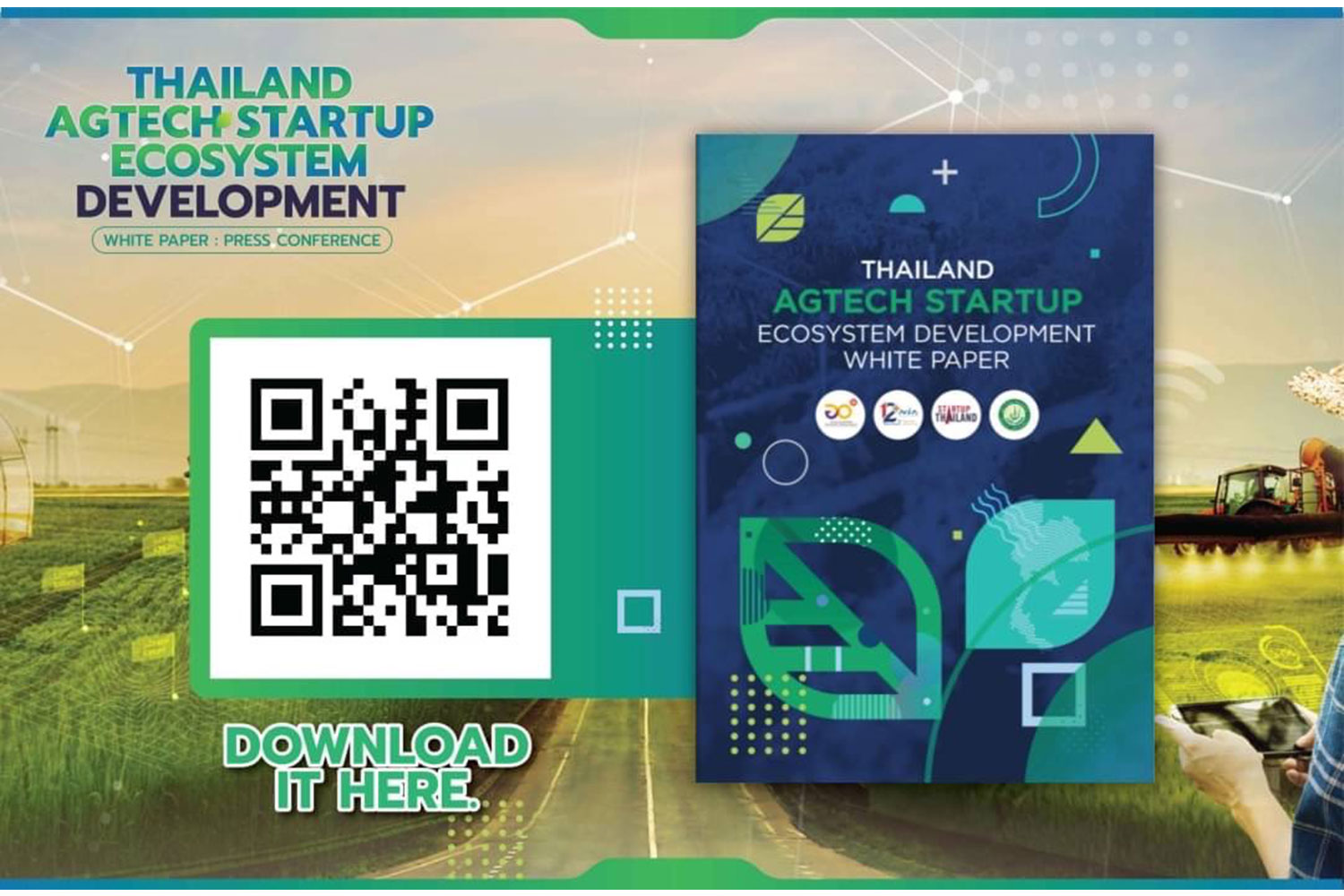
Innovation is disrupting an existing agricultural industry on a global scale. With a third of national labour in agriculture, Thailand must keep up with modern practices to foster agricultural progress and resilience amid the economic complexities brought on by the Covid-19 pandemic, so as to remain among the world’s leading agriculture producing and servicing countries.

This need for change has led the National Innovation Agency (NIA) of Thailand to collaborate with Maejo University on the Thailand’s first AgTech Startup Ecosystem Development White Paper to bring together innovation-driven AgTech Startups to power agricultural transformations and self-reliance in accordance with the Thai Government’s innovation vision.

Dr. Pun-Arj Chairatana, Executive Director of NIA, provided insights into the significance of the agricultural sector and the benefits of developing the white paper in Thailand: “While agriculture has contributed to national progress in economic and social development, the country hasn’t sufficiently paid back the industry, especially in regards to agricultural overall systems, funding, and policies.”
“NIA’s inspection of the agricultural sector reveals game-changing potential in creating AgTech Startup Ecosystems to maximise use of available resources, develop ‘deep tech’ solutions, and thereby turn Thailand into a change-maker and agricultural hub for AgTech Startups in Southeast Asia.”
The roadmap of the AgTech Startup Ecosystem Development White Paper comprises four phases: Emergence, Agglomeration, Globalisation, and Harmonisation. “Currently, we are targeting AgTech Startups to create more of our own DeepTech solutions,” Dr. Pun-Arj explained.

“NIA will be acting as a platform that bundles separate AgTech Startups together for the exchange of knowledge and assists them with well-calibrated tools for long-term success.”
“Our innovation ladders, which are central to plans for revolutionising agricultural sectors, are: 1) Technological shift from perspiring (traditional) to automated agriculture; 2) Replacement of Middle-man Economy with Monetisation of Agriculture; 3) Driving Blockchain Technology (FinTech) to switch from a supply-dominated market to democratised market; 4) Incorporating Bio-Circular-Green Economy (BCG Model) for efficient resource management to move towards lean agriculture, and; 5) Positioning Thailand as an AgTech leader,” Dr. Pun-Arj elaborated, before moving on to execution of the policy.
“Innovative mindset is a key. We plan to put a greenhouse over these ideas and allow them to flourish by implementing three essential action-tools: 1) Identifying trends for agricultural innovation to ensure an increase in value and market availability for AgTech Startups’ development; 2) Evolving AgTech Startups entrepreneurship, by integrating Digital solutions and Deeptech startup establishment, such as Artificial Intelligence (AI), Big Data, Internet of Things (IoT), Sensor, Robotics & Automation, and others, and; 3) Engaging with the international market and seeking opportunities for funding by weaving different parts of the ecosystem together into a co-farming space.”

As for progress and future direction, Dr. Pun-Arj explained: “Despite being in the initial phase, we saw over 70 prospective AgTech Startups and SMEs join our previous White Paper event, compared with 53 existing AgTech Startups in 2020, almost equivalent to the number of other AgTech organisations combined.”
“The majority of AgTech Startups are founded by 25-50-year-old individuals with university education and we are now convincing a group of 20-25-year-olds to come along as they are physically ready and eager to take up the challenges and make decisions that can potentially open new doors for the industry. What’s more, we’ve found that 82.5% of these entrepreneurs aren’t just looking for personal profit, but ways that they can contribute back to society.”
“Using the three action-tools can attract more individual social enterprises which will constitute the success of the roadmap’s first phase and pave the way to the agglomeration phase where AgTech startups collaborate effectively. Their collaboration, sharing of assets, human resources and knowledge will propel the ecosystem into the third phase in which product improvement and market expansion manifest. Ultimately, we’ll reach the harmonisation phase, where efficient ecosystems enable drastic increases of value in the agricultural sector overall.”

Dr. Pun-Arj also revealed an approximate investment fund of 772 million baht from 41 AgTech Startups, which has remained in the same range as neighbouring countries such as Malaysia, Vietnam, Myanmar while falling behind countries like Singapore and Indonesia. However, he also gave his assurance that NIA’s roadmap will improve the financial intake of the AgTech Startups Ecosystem overall.
“Access to funding is one of the most crucial factors for entrepreneurial success. To stand more chance of attracting international Venture Capital (VC), Corporate Venture Capital (CVC), and international angel investors, it is crucial that we demonstrate promising agricultural ecosystems alongside technological integration.”
“Currently, AgTech Startups rely heavily on local finance and banking, at 66.7%. Our roadmap can turn our AgTech Startups Ecosystem into an investment magnet for AgTech Startups as a whole, and thereby gain a financial boost from offshore VC, CVC, and angel investors.”
“Offshore funding will provide better support for AgTech Startups with focus on Deep Tech solutions, such as Sensor and IoT, which currently receiving the second-highest investment in Thailand which is on par with the global trend. Likewise, we can improve some of the more neglected areas such as Biotechnology which ranks only 6th for funding in Thailand while the rest of the world places utmost priority on it.”
“The Thailand AgTech Startup Ecosystem Development White Paper was designed to accelerate the gradual progress of transformation with a leap forward in a matter of years. This is to be achieved by optimising our fundamental agricultural structure and bringing more long-term development funding through. Ultimately, we will be able to reduce costs, increase production capacity and, most importantly, create new export markets into which we can grow outwardly at the same time as providing payback to farmers. Combining the concept of innovation with subsistence, we hope to attract younger generations to participate in the AgTech Startups Ecosystem as this will accentuate agriculture’s status as a pillar of the Thai economy,” Dr. Pun-Arj concluded.